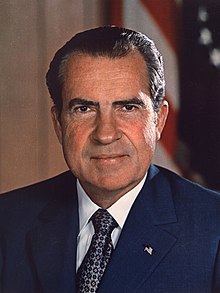📖 Presidential Profile
Comprehensive overview of leadership, policies, and historical significance
📋 Biography & Political Journey
Early Life and Political Rise
Richard Milhous Nixon was born on January 9, 1913, in Yorba Linda, California, to a family of modest means. He attended Whittier College and Duke University Law School before serving in the Navy during World War II. Nixon entered politics in 1946, winning election to the House of Representatives by defeating incumbent Democrat Jerry Voorhis. He gained national attention as a member of the House Un-American Activities Committee, particularly for his role in the Alger Hiss case. Nixon was elected to the Senate in 1950 and became Dwight Eisenhower’s running mate in 1952 at age 39.
Vice Presidency and 1960 Defeat
As Eisenhower’s Vice President for eight years, Nixon gained valuable experience in foreign affairs and domestic politics. He famously engaged in the “Kitchen Debate” with Soviet Premier Nikita Khrushchev in 1959, defending American capitalism and consumer culture. Nixon won the Republican nomination for president in 1960 but lost narrowly to John F. Kennedy, with many believing his poor performance in the first televised presidential debate contributed to his defeat. After losing the California governor’s race in 1962, he told reporters, “You won’t have Nixon to kick around anymore,” seemingly ending his political career.
Presidential Comeback and Major Achievements
Nixon staged a remarkable political comeback, winning the presidency in 1968 during a turbulent year marked by the Vietnam War, civil unrest, and political assassinations. His major achievements included opening diplomatic relations with China in 1972, pursuing détente with the Soviet Union, and signing the SALT I nuclear arms limitation treaty. Domestically, Nixon established the Environmental Protection Agency, signed the Clean Air Act, and implemented the first federal affirmative action program. He also began withdrawing American troops from Vietnam while pursuing a policy of “Vietnamization.”
Watergate Scandal and Resignation
Nixon’s presidency unraveled due to the Watergate scandal, which began with a break-in at the Democratic National Committee headquarters in June 1972. As investigations revealed the involvement of his administration and attempts to cover up the crime, Nixon’s position became untenable. The release of secretly recorded White House tapes revealed his knowledge of the cover-up, leading to certain impeachment by the House of Representatives. Facing removal from office, Nixon became the first president to resign, announcing his decision on August 8, 1974, saying, “I have never been a quitter. To leave office before my term is completed is abhorrent to every instinct in my body.”
Peculiar Habits and Memorable Quotes
Nixon was known for his awkward public persona and unusual behavior, including his famous “I am not a crook” declaration during a press conference in 1973. He had peculiar habits like eating cottage cheese with ketchup for lunch and bowling alone in the White House bowling alley late at night while classical music played. Nixon once tried to appear more relatable by awkwardly walking on the beach in dress shoes and suit pants, creating an enduring image of his disconnect from ordinary behavior. His farewell speech to the White House staff was emotional and rambling, including the famous advice: “Never be petty. Always remember, others may hate you, but those who hate you don’t win unless you hate them, and then you destroy yourself.”
Humor & Jokes
Nixon's Sweating
Why did Nixon sweat so much during the Kennedy debate? Because his conscience was working…
Read More →Greatest Wins
🎖️ Ending the Military Draft and Creating All-Volunteer Army
Nixon fulfilled his campaign promise to end the controversial Vietnam-era draft, transitioning to a professional…
Read More →Epic Fails
🇨🇱 Chilean Coup and Allende Overthrow
CIA-backed coup in Chile removed democratically elected Salvador Allende, installing brutal Pinochet dictatorship that killed…
Read More →